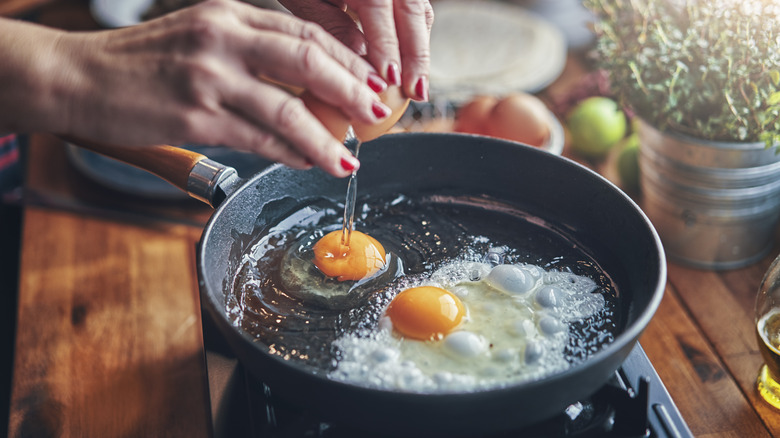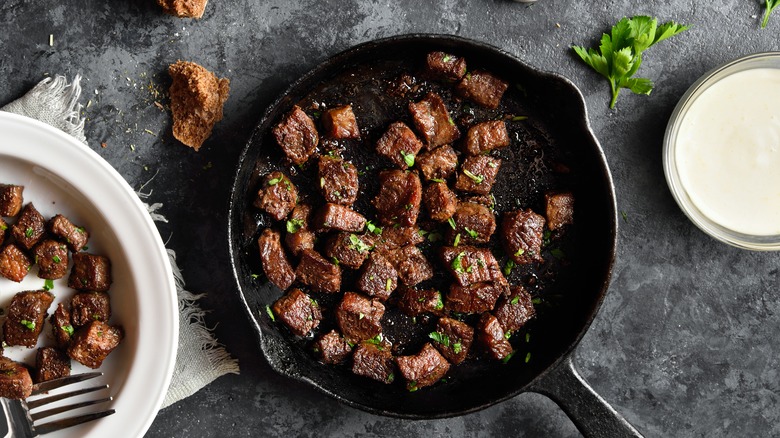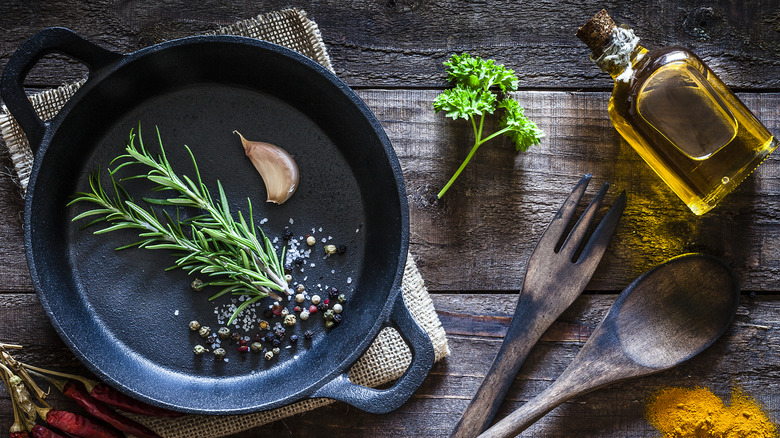The Best And Worst Way To Clean Your Cast Iron Skillet
From searing steaks to baking cornbread, cast iron skillets can tackle countless tasks around the kitchen as long as you take proper care of them. These hefty tools have garnered a bit of a reputation for being difficult to clean, which can intimidate curious cooks from trying them out for fear that their investment will turn to rust. But keeping a cast iron skillet clean is a relatively easy task, and with a bit of know-how on the do's and don'ts of cast iron maintenance, your skillet can last you a lifetime.
Start by washing your cast iron skillet as soon as you bring it home from the store. Using hot water, a bit of dishwashing soap, and the abrasive side of a sponge, remove any dust or debris the pan may have accumulated on its journey from the factory to your kitchen. Rinse it thoroughly and ensure it is completely dry before you season it.
Seasoning your pan stops food from sticking to it while you cook. Dip a paper towel in a bit of neutral oil, like vegetable oil, and use it to cover the entire surface of the pan. Then, use a clean paper towel to soak up any excess so you're left with an extremely thin layer. Pop it in a 350-degree Fahrenheit oven for an hour, let it cool, and you're ready to start cooking.
What to avoid with your cast iron pan
The process of washing, drying, and seasoning your skillet is all you need to keep it in good shape, but it's essential that you complete each step properly. For example, when washing your skillet, don't use steel wool, as it can scratch through the seasoning and even the pan's surface. Instead, use a scrubbing pad, a plastic bristle brush, or a chainmail pad made specifically for removing stuck-on food from cast iron. You can also gently use a pan scraper for especially tough messes.
You should also avoid submerging your cast iron skillet in water. This means don't run it through the dishwasher or leave water in it to loosen up stuck-on food. Letting your pan stay in contact with water for too long will cause rust, which can be a headache to remove and may damage your pan. No matter how dirty your pan is, the best way to keep it clean is to wash it right after using it. After the initial wash, room temperature water and a tiny bit of soap should get the job done, or you can use a paper towel to rub coarse salt over the pan to remove caked-on bits of grime.
More maintenance tips
If you're struggling to clean off food that has fused to the surface of your cast iron pan, fill it with a bit of water and let it simmer on the stove. After a few minutes, dump the water and scrape off the food while the skillet is still warm; any food remnants should now come off easily. Since water causes rust, it's imperative that you ensure your skillet is completely dry before putting it away.
Aside from keeping it clean, there's little else you need to do to maintain your skillet. You can follow the steps to season it in the oven every few months, but you can also season your cast iron skillet by simply cooking with it. Using your skillet for recipes that call for a lot of fat, like fried chicken, fried eggs, or bacon, will leave a coating of oil. That's why you don't want to overdo cleaning your pan — over time, your cast iron pan will develop a patina of seasoning that will deter rust, stop food from sticking, and add a bit of flavor to everything you make.


